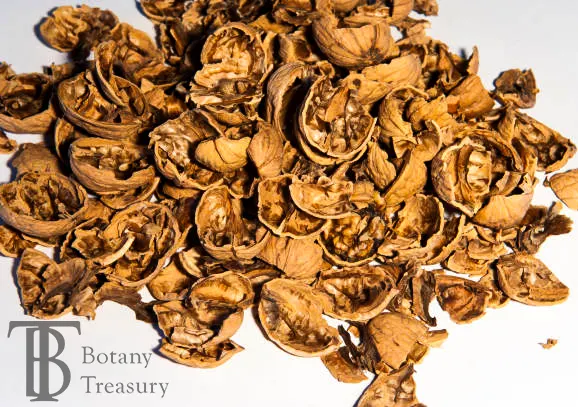
Walnut Skin (Shell, Husk)
Walnuts have a shell and a husk. The shell is the hard outer covering that encases the nut, while the husk is the thin, green skin that covers the walnut before it ripens.
Walnut hard shell
Here are some of the key uses:
- Biofuel Production: Walnut shells can be used as a feedstock for the production of biofuels such as bioethanol and biodiesel. The high lignin content of walnut shells makes them an attractive renewable resource for this purpose.
- Adsorbents and Activated Carbon: The porous structure and high carbon content of walnut shells make them suitable for the production of adsorbents and activated carbon, which can be used in water purification, gas separation, and other industrial applications.
- Composite Materials: Walnut shell powder can be used as a filler in the production of wood-based composite materials, such as particleboards, improving their mechanical and thermal properties.
- Chemicals and Biochemicals: The lignocellulosic components of walnut shells can be fractionated and converted into valuable chemicals and biochemicals, such as xylo-oligosaccharides, through processes like autohydrolysis and organosolv fractionation.
- Energy and Fuel: Walnut shells can be used as a renewable energy source, either directly as a solid fuel or through conversion processes like liquefaction to produce liquid fuels. The high calorific value of walnut shells makes them a suitable biomass feedstock for energy applications.
- Industrial Applications: Walnut shell powder has various industrial applications, such as in oil well drilling, cleaning aircraft engines, and polishing jewelry, due to its abrasive properties.
- Cat Litter: Ground walnut shells are used as a sustainable and biodegradable alternative to traditional clay litter for cats.
- Natural Exfoliant: Walnut shell powder can be used as a natural exfoliant to remove dead skin cells and promote a smoother complexion. It is often used as a facial scrub to remove impurities and improve skin texture.
- Hair Loss Prevention: The biotin present in walnut shell powder helps prevent hair loss by promoting healthy hair growth. It is also effective in reducing dandruff and other scalp issues.
- Antioxidant Properties: Walnut shell contains antioxidants that protect the skin from damage caused by free radicals, reducing signs of aging and promoting healthy skin.
- Skin Irritation Relief: The antioxidants in walnut shell can help soothe and calm irritated skin, making it a popular ingredient in skincare products.
Walnut Husk
Walnuts have a green, leathery outer layer called the husk. When the walnut fruit fully ripens on the tree, the husk cracks open, revealing the hard, light brown shell underneath.
Walnut husks are considered an agricultural byproduct generated during walnut cultivation and processing. However, they are rich in beneficial compounds like phenols, triterpenoids, and naphthoquinones that have potential health and industrial applications.
Composition and Properties of Walnut Husk:
- Walnut husk is rich in bioactive compounds like polyphenols, tannins, essential oils, fatty acids, and pigments.
- It has potent antioxidant, antimicrobial, anti-inflammatory, and other beneficial properties.
- The husk contains high levels of compounds like juglone, anacardic acids, carotenoids, and chlorophylls.
Applications of Walnut Husk:
Food and Agriculture:
– Used as a natural food coloring and flavoring agent.
– Incorporated into meat products like sausages to improve quality and shelf-life.
– Utilized as a natural pesticide and biofertilizer in agriculture.
Cosmetics and Personal Care:
– Walnut husk powder and extracts used for hair coloring and skin tanning.
– The oil from the husk is used as a natural tanning agent.
Medicinal and Pharmaceutical:
– Extracts exhibit antioxidant, antimicrobial, and anti-inflammatory activities.
– Potential applications in wound healing, skin care, and as a natural preservative.
Industrial Applications:
– Used as a natural adsorbent for removing dyes, heavy metals, and other pollutants from industrial effluents.
– Can be converted into activated carbon, biofuels, and other value-added products.
In summary, walnut husk is a rich source of beneficial phytochemicals that can be leveraged in food, cosmetic, medical, and industrial applications, reducing waste and creating new opportunities for the walnut industry. Ongoing research is exploring innovative ways to better utilize this valuable byproduct.
Botany Treasury is a leading provider of high-quality walnut skin. If you are interested in purchasing our walnut skin, please don’t hesitate to get in touch with us.
